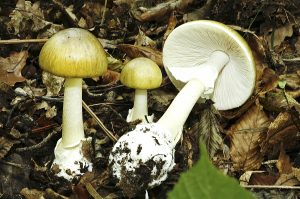Australia is in the grip of yet another sordid true crime saga in the form of the infamous (alleged) “mushroom murders” in a case that involves possible poisoned beef wellingtons, a Sunday lunch turned deadly and a trail of perhaps attempted murders stretching back to 2021.
The case centers on 49-year-old Erin Patterson who, on July 29 last year, hosted a luncheon with the family of her ex-husband Simon Patterson, including his parents and his aunt and uncle.
At the luncheon in the town of Leongatha, Patterson, whose husband was not in attendance, served what has now become an infamous dish – a beef wellington which included a slab of beef, latticed pastry, and a mushroom duxelles, a traditional mix of minced mushrooms, herbs, and onions.
Following the meal, Simon Patterson’s mother, father, aunt, and uncle complained of gastroenteritis-like symptoms and went to hospital the next day. In the coming days, his father, mother and aunt died, while his uncle made a slow recovery after falling into a coma.
In an explosive development following an already tragic story, Erin Patterson was arrested and has now been charged with three counts of murder and five of attempted murder, including four counts of attempted murder of her husband in the years prior to and including the fatal lunch.
Police allege that Erin Patterson spiked the beef wellington with death cap mushrooms, a single bite of which can prove fatal.
The case has transfixed people the world over since Erin Patterson was arrested in November last year, and interest has renewed following her appearance in court in Australia on Monday.
In many ways, the case is similar to that of Indonesian Jessica Kumala Wongso, who was jailed for 20 years by a Jakarta court in 2016 after being found guilty of the murder of her friend, Wayan Mirna Salihin.
Salihin died on January 6, 2016 after drinking a Vietnamese iced coffee, ordered by Wongso, at the upscale Olivier Cafe in the swanky Grand Indonesia Mall. The police said that Wongso was jealous of her friend, who had recently married, and had spiked the coffee with cyanide.
The Salihin-Wongso case captivated Indonesia for months as the trial, which was televised, dragged on, sparking a barrage of commentary similar to Erin Patterson’s case, and prompting the question: why do we find (alleged) female murderers so fascinating?
Perhaps part of the answer is that, statistically, female murderers are far rarer than men.
According to data from the United Nations Office on Drugs and Crime Global Study on Homicide 2023, some 90 percent of suspects brought into contact with police for intentional homicides in 2021 were men, meaning that for every 10 murders globally, nine were committed by men and only one by a woman.
Men are also more likely to be victims of homicide, the report said, accounting for 81 percent of victims of intentional homicide globally in 2021. The way in which men are likely to murder is also different, with young men aged between 15 and 29 most at risk and often the result of a vortex of violence. Men are more likely to die, for example, as the result of an escalating fight during which one or both draw a knife or a gun, or beat each other with bare fists.
How women murder however is quite different.
According to an article in the Washington Post, using data taken from the Federal Bureau of Investigation Supplemental Homicide Report, “Women use guns way less than half the time, although it still remains the most popular weapon among women. After guns, women are likely to use a knife, to beat their victim to death or to strike them with a blunt object. After guns, poison is the sixth most common way for a woman to kill.”
While poison is a less frequently used method of killing for both men and women, it stands out statistically.
“With all guns removed, women are almost four times as likely as men to use poison. It is used in just over 1 percent of killings by men, and just over four percent of killings by women. In the final analysis, men kill with poison more often. But it is the weapon of choice by women murderers much more than men, even if the male predilection for guns is removed,” the Washington Post article continues.
“Yes, poison is a women’s weapon.”
That women choose poison more than men does not mean that either Wongso or Patterson are definitively guilty of the crimes of which they were accused (although Wongso was convicted in a court of law), but perhaps the data shows why we are so mesmerized by cases such as these.
Knowing that women have a predilection for poison – which makes sense when the use of physical force is often stacked in a man’s favor – any case in which a woman appears to have played the part of a merry murderess cooking up poisoned potions, be they cyanide-laden coffee or death cap beef wellingtons, is likely to capture the collective imagination.
With Patterson’s trial only just beginning, we shall have to wait and see if she will add to the statistics.

































